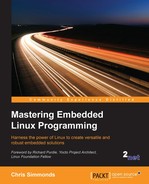The C library is not a single library file. It is composed of four main parts that together implement the POSIX functions API:
libc: The main C library that contains the well-known POSIX functions such asprintf,open,close,read,write, and so onlibm: Maths functions such ascos,exp, andloglibpthread: All the POSIX thread functions with names beginning withpthread_librt: The real-time extensions to POSIX, including shared memory and asynchronous I/O
The first one, libc, is always linked in but the others have to be explicitly linked with the -l option. The parameter to -l is the library name with lib stripped off. So, for example, a program that calculates a sine function by calling sin() would be linked with libm using -lm:
arm-cortex_a8-linux-gnueabihf-gcc myprog.c -o myprog -lm
You can verify which libraries have been linked in this or any other program by using the readelf command:
$ arm-cortex_a8-linux-gnueabihf-readelf -a myprog | grep "Shared library" 0x00000001 (NEEDED) Shared library: [libm.so.6] 0x00000001 (NEEDED) Shared library: [libc.so.6]
Shared libraries need a run-time linker, which you can expose using:
$ arm-cortex_a8-linux-gnueabihf-readelf -a myprog | grep "program interpreter" [Requesting program interpreter: /lib/ld-linux-armhf.so.3]
This is so useful that I have a script file with these commands into a shell script:
#!/bin/sh ${CROSS_COMPILE}readelf -a $1 | grep "program interpreter" ${CROSS_COMPILE}readelf -a $1 | grep "Shared library"
..................Content has been hidden....................
You can't read the all page of ebook, please click here login for view all page.
